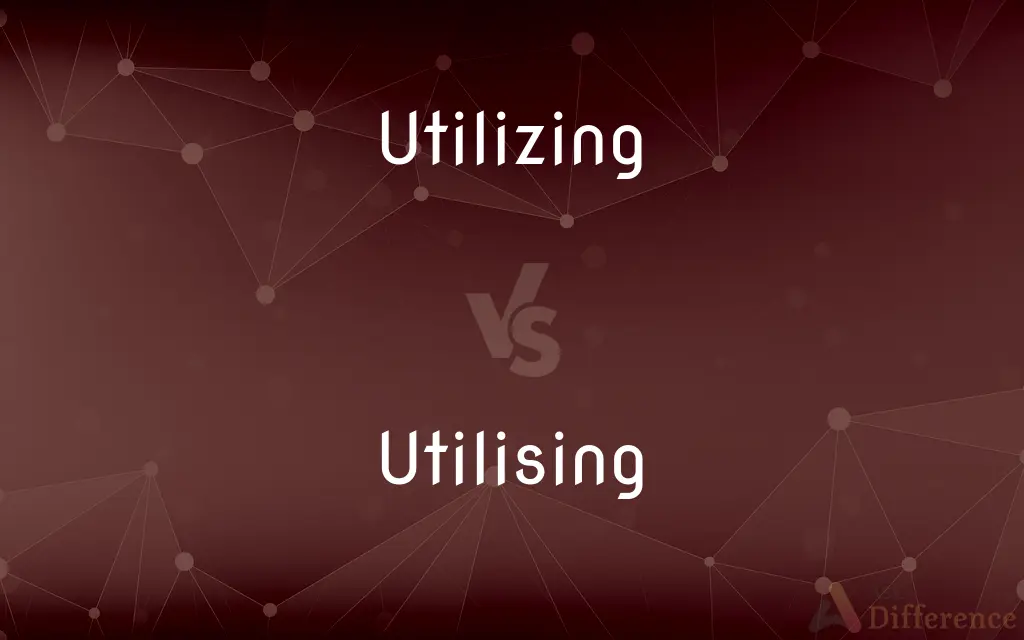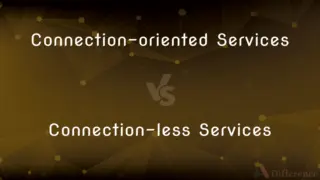Utilizing vs. Utilising — What's the Difference?
By Tayyaba Rehman — Published on January 3, 2024
"Utilizing" and "Utilising" mean the same, making effective use of something; the difference lies in regional spelling preferences, with "utilizing" favored in American English and "utilising" in British English.

Difference Between Utilizing and Utilising
Table of Contents
ADVERTISEMENT
Key Differences
"Utilizing" and "Utilising" both refer to the act of making use of something effectively. The primary difference between them is not in meaning but in regional spelling conventions. "Utilizing" is the preferred form in American English, which tends to favor -ize endings.
Conversely, "Utilising" follows the British English convention of using -ise endings. This difference mirrors a broader pattern in American and British English where verbs that can end in -ize or -ise are spelled differently in the two variants of the language.
Beyond the spelling, there is no distinction in the application or connotation of "utilizing" and "utilising." Both terms are used in various contexts, from business and technology to everyday language, to express the act of employing something to its fullest potential or in a practical manner.
The choice between "utilizing" and "utilising" often depends on the audience or the established language standards of a particular document or organization. Writers and speakers typically choose the variant that aligns with the version of English they are using or the version their audience will be most familiar with.
Despite the spelling difference, the pronunciation of "utilizing" and "utilising" is generally the same. Both spellings represent the same concept of effective and practical use of resources, tools, skills, or opportunities.
ADVERTISEMENT
Comparison Chart
Spelling Standard
American English
British English
Spelling Variation
Ends with -izing
Ends with -ising
Pronunciation
Generally the same as utilising
Generally the same as utilizing
Meaning
Making effective use of something
Making effective use of something
Usage Context
Preferred in American publications and communications
Preferred in British publications and communications
Compare with Definitions
Utilizing
Employing for a purpose
We are utilizing the latest technology in our research.
Utilising
Employing for a purpose
The company is utilising renewable energy sources.
Utilizing
Making effective use
She is utilizing her skills to improve the project.
Utilising
Taking advantage of
She is utilising her network to find job opportunities.
Utilizing
Taking advantage of
He is utilizing the opportunity to learn new skills.
Utilising
Making practical use of
They are utilising space in the office creatively.
Utilizing
Making practical use of
She is utilizing her time efficiently.
Utilising
Putting to use
Researchers are utilising data to study climate change.
Utilizing
Putting to use
The team is utilizing all available resources to meet the deadline.
Utilising
Making effective use
He is utilising his experience to train new employees.
Utilizing
To put to use, especially to make profitable or effective use of
An approach to the problem that utilizes the latest research.
How plants utilize nutrients to produce seeds.
Utilising
Infl of utilise
Utilizing
Infl of utilize
Common Curiosities
Can "utilising" be used in American English?
It can be, but "utilizing" is the standard spelling in American English.
Are "utilizing" and "utilising" interchangeable?
Yes, but usage depends on whether American or British English is being used.
Is one spelling more correct than the other?
No, correctness depends on the regional language standard being followed.
Does "utilizing" have a different meaning in American English?
No, it means the same as "utilising" in British English.
Should I use "utilizing" in an international context?
It depends on the audience; "utilizing" is widely understood, but "utilising" may be preferred in British English-speaking regions.
In academic writing, which form should be used?
Use the form that aligns with the language standards of the institution or publication.
Can a sentence's meaning change with the use of "utilizing" or "utilising"?
No, the meaning remains the same regardless of the spelling.
Does "utilizing" appear more in American literature?
Yes, it's more common in American English literature.
Are both forms used in global English language teaching?
Yes, learners are often exposed to both forms in international English language education.
Can "utilizing" be used in formal writing?
Yes, especially in American English contexts.
Do "utilizing" and "utilising" have different pronunciations?
Generally, no, they are pronounced the same.
Is "utilising" commonly used in British publications?
Yes, it's the preferred spelling in British English.
Are there other words with similar American and British spelling differences?
Yes, like "realize" and "realise" or "organize" and "organise."
Does using "utilising" in American English texts appear incorrect?
It's not standard, but it's understood; it may be seen as a British English influence.
Is one form more modern than the other?
No, both forms have been in use for a long time and reflect regional spelling preferences.
Share Your Discovery

Previous Comparison
Connection-oriented Services vs. Connection-less Services
Next Comparison
IntelliJ Ultimate vs. IntelliJ CommunityAuthor Spotlight
Written by
Tayyaba RehmanTayyaba Rehman is a distinguished writer, currently serving as a primary contributor to askdifference.com. As a researcher in semantics and etymology, Tayyaba's passion for the complexity of languages and their distinctions has found a perfect home on the platform. Tayyaba delves into the intricacies of language, distinguishing between commonly confused words and phrases, thereby providing clarity for readers worldwide.












































